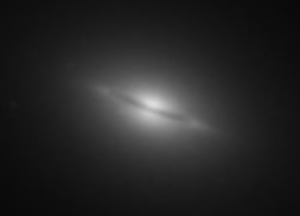NGC 1270
| Galaxy NGC 1270 |
|
|---|---|

|
|
| High-resolution image of the center of NGC 1270, taken with the Hubble Space Telescope | |
| AladinLite | |
| Constellation | Perseus |
|
Position equinox : J2000.0 , epoch : J2000.0 |
|
| Right ascension | 03 h 18 m 58.1 s |
| declination | + 41 ° 28 ′ 12 ″ |
| Appearance | |
| Morphological type | E: |
| Brightness (visual) | 13.3 mag |
| Brightness (B-band) | 14.3 mag |
| Angular expansion | 0.9 ′ × 0.7 ′ |
| Position angle | 15 ° |
| Surface brightness | 12.9 mag / arcmin² |
| Physical data | |
| Affiliation | Abell 426 |
| Redshift | 0.016561 +/- 0.000053 |
| Radial velocity | 965 +/- 16 km / s |
|
Stroke distance v rad / H 0 |
(226 ± 16) x 10 6 ly (69.4 ± 4.9) Mpc |
| history | |
| discovery | Heinrich Louis d'Arrest |
| Discovery date | February 14, 1863 |
| Catalog names | |
| NGC 1270 • UGC 02660 • PGC 12350 • CGCG 540-095 • MCG + 07-07-057 • 2MASX J03185814 + 4128121 • GALEX ASC J031858.07 + 412812.4 • LDCE 224 NED184 | |
NGC 1270 one elliptical galaxy from the Hubble type E2 in the constellation Perseus in the northern sky . It is an estimated 226 million light years from the Milky Way , has a diameter of about 60,000 ly, and is a member of the Perseus Cluster Abell 426 .
In the same area of the sky are u. a. the galaxies NGC 1267 , NGC 1268 , NGC 1271 , NGC 1272 .
The object was discovered by Heinrich d'Arrest on February 14, 1863 .
Web links
Commons : NGC 1270 - collection of images, videos, and audio files
